You notice that your water doesn’t feel as soft as it usually does! There is plenty of salt in your water softener brine tank. And you heard your water softener regenerating just the other day. So why isn’t your water soft? Could your water softener be clogged?
Parts and the resin inside of a water softener can get clogged with sediment, debris, and iron from your water which can inhibit the performance of your water softener. Most parts that can get clogged in a water softener can get cleaned or replaced to get the water softener working properly again.
Is your water softener clogged, and if so, is there anything that you can do about it? In most cases, a water softener has been designed so that areas that can get clogged are accessible. So if a clog occurs the clog can be cleared to bring your water softener back to life.
What can cause my water softener to get clogged?
Debris, iron, and manganese in your water can cause clogging in your water softener.
Clogged openings inside of a water softener can prevent your water softener from softening your water. Worse yet, clogging in your water softener can even cause poor water pressure.
A water softener is made up of many valves and openings that the water has to be able to go through smoothly in order for the water softener to operate properly.
Sediment, debris, iron, and manganese in your incoming water can lodge or build up in these openings causing problems with your water softener functions.
Water softeners often have water pre-filters and internal screens to filter out impurities in your water that can cause problems.
These filters and screens can sometimes get clogged and have to be cleaned or changed in order for your water softener to soften your water.
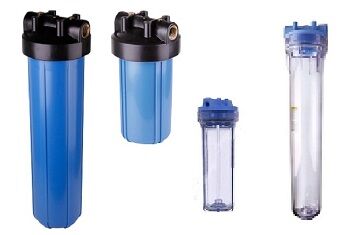
Recommended Whole House Filters
Most homes will have some sort of sediment coming in from their water supply. And many homes can experience odors or odd-tasting water. This is why I highly recommend this … Continue reading
A water softener pre-filter can get clogged and cause your water softener to malfunction.
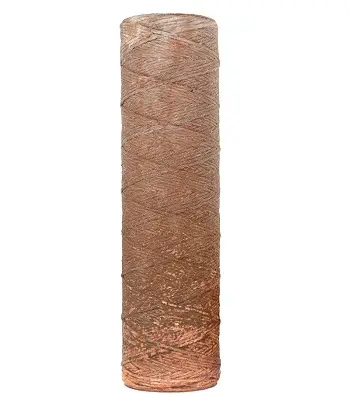
Replacing your water softener pre-filter often enough is very important to keep unwanted debris from getting into your water softener.
Changing your water softener pre-filter is also important to prevent potential clogging inside of your water softener.
Debris in your water can cause clog a water softener injector which creates the draw that draws the brine from your brine tank.
If the injector gets clogged, your water softener will not get the brine that it needs to regenerate its water softener resin and leave your brine tank full of water.
This means that your water softener will not be able to soften your water.
Failure to replace your water softener pre-filter often enough can cause insufficient water flow to your water softener resulting in your water softener being unable to soften your water and even salty water going into your home.

How Often Should I Change My Whole House Water Filter?
How often a whole house filter needs to be changed will depend on several factors. There is no one answer when it comes to how often you should change your water filter……Continue reading
After a water softener uses the brine from your brine tank, it needs to flush the brine out of its resin tank.
If your water softener doesn’t get sufficient water pressure due to a clogged pre-filter, the brine can end up getting into the plumbing of your home and into your drinking glass, yuck!
Poor water pressure can cause your water softener to draw the brine slower than normal.
This means that it may still be drawing the brine at the end of the regeneration cycle when it should have been rinsed out already.
What parts of a water softener can get clogged?
The water softener injector or venturi:
Inside a water softener, there is an injector or venturi which creates the draw that draws the brine from the brine tank and flows it through the water softener resin.
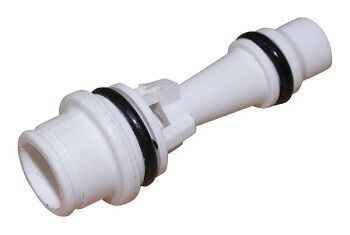
If this injector or venturi gets clogged by debris or build-up, it will not be able to create the draw needed to use the brine and the water softener resin will not get regenerated.
The injector or venturi protecting screen:
The injector or venturi is protected by a screen to prevent debris from getting into the injector or venture.
This screen can also get clogged by the build-up of debris which will also prevent draw from being created. Without a strong draw, the brine will not be able to regenerate the water-softener resin.
The water softener resin:
The resin inside of a water softener looks a bit like filtering sand but it is not intended to be a filtering media.
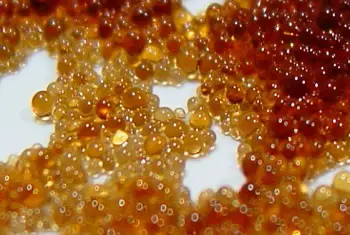
Although, the water-softener resin can filter out some sediment from your water and rinse it away during its regeneration process, sometimes the sediment can stay in the resin.
Sediment that remains in the water-softening resin can settle at the bottom of the tank causing clogging and poor water pressure.
This is the primary reason that you have a sediment pre-filter before your water softener.
You should make sure to change the filter on a regular basis to keep sediment and debris from getting into your water-softener resin bed.
Some people think that their water softener has gotten clogged due to an excess of hard minerals clogging the water softener resin, but when water softener resin has removed all of the hardness that it can, any passing hardness will simply flow by the resin and leave the water softener.
As long as your water softener has been using salt, it has most likely been removing the hard minerals from its resin as long as the brine is strong enough to do so.
How a water softener regenerates its resin to prevent clogging.
When a water softener regenerates, it is removing the hard minerals that have been removed from the water and collected on its water softener resin.
It does this by using sodium ions to replace the hard minerals on the resin and rinse the hard minerals away so the resin can remove more hard minerals.
Clogging in your water softener can inhibit its performance so the water softener resin doesn’t get cleared of minerals and iron.
A build-up of iron on water softener resin can create less space between the resin beads which can mean poor water pressure.
Using a water-softener resin cleaner once a year can help your water-softener resin last longer and soften your water more efficiently.
Chlorine can damage water-softener resin and cause clogging.
Another way that water softener resin can get clogged is if it is exposed to chlorine from a municipal water source for an extended period of time.

Can Water Softener Resin Go Bad?
Even though water softener resin is made of durable polystyrene, it can be damaged by continued exposure to high levels of chlorine or excessive build-up of iron on the resin. … Continue reading
Chlorine in your water will damage the water softener resin in your water softener and can make it soft and mushy.
Soft resin beads smush together like marshmallows stuffed into a jar and prevent water from flowing through the resin easily.
Your water softeners’ drain line:
Although your water softeners’ drain line may look like it is clogged, it’s probably not.
Most of the time it is just stained by the dirty water that has been rinsed from your water softener.
But if the water pressure going through your water softener is insufficient to flush the debris completely out of the drain line, it can settle in the drain line and cause clogging over time.
If this happens, you should be able to disconnect the drain line and let the clogging debris empty into a bucket.
Then check your water pre-filter to make sure that your water softener is getting all of the water pressure that it needs to properly rinse away debris from the drain line.
A clog in your water softeners’ brine line:
There can be some dirt and debris in most salt that is put into a brine tank.
Most of the time the debris will simply settle to the bottom of the brine tank and stay there until the brine tank is manually cleaned.
It is not common for a water softener brine line to get clogged, but sometimes this debris can get drawn into the brine line.
In the rare case when some debris from the brine tank does get drawn into the brine line, it usually will go through the water softener and then it will get rinsed away out the drain line.
Clogged plumbing going into your water softener:

Because the water going into a water softener still contains hard minerals, the hard minerals can build up on the plumbing leading into the water softener causing restriction and clogging.
This build-up of hard minerals on the plumbing before the water can flake off and get lodged inside of the water softener valve, causing valves to not close correctly or the water softener injector or venturi to clog.
Can there be a clog in my water softener brine tank?
A water softener brine tank has a brine float assembly that sits inside a long tube that separates the brine float assembly from the salt in the brine tank.
For the most part, only the brine from the brine tank will go through the brine tubing and clogging is not very common.
However, the salt in a brine tank can re-crystallize around the opening of the screen of the brine float assembly.
Clogging this opening will prevent the brine from getting into the water softener.
Slowly pouring a little warm water down the brine tube can help to clear the salt clogging.
If needed, you can remove the brine float assembly and soak it in clean water to dissolve the salt of the brine float assembly, then replace it in the brine tank.
Can the salt in my brine tank clog my water softener?
The salt in your brine tank gets dissolved before it reaches the brine tubing that delivers the brine into your water softener.
Once the brine enters your water softener, it gets further dissolved by the water that is used to draw the brine from the brine tank.
Because the salt has been dissolved and diluted so much, it is highly unlikely that it will recrystallize inside any part of your water softener and cause any clogging.
To Sum Up!
For the most part, a water softener itself will not get clogged.
But there are several parts of a water softener that can get clogged which will cause the water softener to malfunction.
Servicing your water softener on a regular can prevent clogging of your water softener and help it keep softening your water for many years.
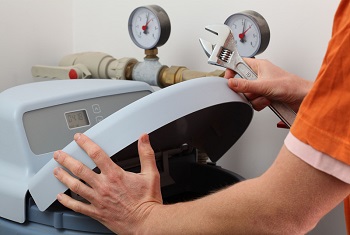
How Often Should I Service My Water Softener? And WHY!
You have had your water softener for a few years now, and so far, so good! You have been adding salt to it regularly and the water feels great, but … Continue reading

